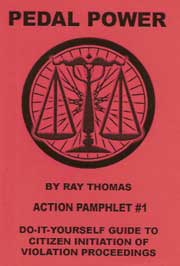
Local bike lawyer Ray Thomas is working on a new campaign to empower injured cyclists to literally take the law in their own hands. His is distributing a new pamphlet titled, “Action Pamphlet #1; Do-it Yourself Guide to Citizen Initiation of Violation Proceedings.” You can find it at local bike shops, download the PDF here or read it below.
This is very important and timely information and I strongly recommend taking a few minutes to read it. Here’s my background commentary followed by the complete text of Ray’s pamphlet:
The way cyclists are treated in injury crashes with motorists is a contentious topic in the bike community. Most cyclists feel that our equal right to the road is not respected by law enforcement personnel and that motorists are usually given the benefit of the doubt when assigning blame, even though cyclists are much more vulnerable road users.
Another major point of contention is that crashes are not investigated unless someone (usually the biker) is entered into the system as a “Level 1 Trauma”. This is a very high injury threshold which means that only a small percentage of crashes are given a full investigation. Regardless of the many reasons why bikes are not fully respected in these situations (we could pound our fists all day), we need to find a better solution and this just might be it.
Ray Thomas wants to educate and empower cyclists to use existing laws to protect our rights to the road. In addition, we need to become better at gathering evidence at the scene of a crash. Make sure to get license plate numbers, carry digital cameras to take photos, find and record contact information of witnesses, and so on. The more evidence we gather the better we’ll do in court and more motorists we’ll hold accountable for their carelessness.
Here is the full text of the pamphlet (you can also download a printer friendly PDF):
What and Why
The purpose of this action pamphlet is to encourage injured riders to create strong enforcement of bicyclist rights to the road in injury accidents by taking things into their own hands and using laws already on the books to charge and convict drivers in court for violation of the Rules of the Road.
In spite of the best of intentions law enforcement agencies do not have the resources or the legal understanding of laws relating to bicycles from a bicyclist perspective, to investigate and issue citations for traffic law violations in most injury accidents. For example, in Portland, Oregon’s most populous city known for its friendly attitude toward bike riders, city police maintain a departmental policy of facilitating exchange of information between the parties to an accident, but not investigating or issuing citations in traffic accidents unless one of the parties is placed into the area hospital Trauma system or the driver has a warrant or a suspended license. The Trauma system only takes the most serious injuries; entry triggers a police investigation including witness accounts and a scene diagram. However many bicycle accidents involve high energy transfers and serious injuries; yet no police investigation is provided—often an unpleasant surprise to many healing bike riders who later find out that it is their word against the motorist when it comes time to make an insurance claim.
Background
Police spokesmen have stated in the past that the Oregon statutes prohibit citation unless the cop witnesses commission of the offense. This is not technically correct because the law (ORS 810.410 (4) ) allows a police officer to issue a citation after an accident based on their own after the fact personal investigation. However, even if a police investigation of the accident is available, non-motorized roadway users may still not like the result because some police officers do not see these user groups as legitimate and rightful roadway users. This paternalistic attitude fails to accord full legal rights to the most vulnerable roadway users, those who because of their vulnerability (since they are not encased in sheet metal) most need vigilant protection of the law.
But, bicyclists must consider fully the high costs associated with more intensive traffic accident investigation by police. After all, the insurance adjuster/attorney system serve pretty well in sorting out who is at fault in most accidents. Police officers’ primary mission is to protect public safety; in the great majority of collisions fault is clear and investigation of accidents is more appropriately performed by claim adjusters in insurance companies. Regardless of where one draws the line, there is a point after which it is just more important for a cop to be working on a criminal case than answering a radio call to conduct a traffic investigation for an intersection collision.
We Can Do It Ourselves
And, without requiring any change in law or policy, Oregon bicyclists already have the legal tools to initiate prosecution of traffic law breakers. Oregon law allows a citizen to initiate traffic violation prosecutions in state court, AND to have police help (per Oregon statute). After the initial report is taken and the citizen signs the Oregon Uniform Citation and Complaint, the completed paperwork is served on the bad driver summoning them to traffic court to face the charges in a non-jury trial in front of a traffic judge. The complaining citizen gives an informal presentation of the case, the judge hears evidence and testimony, and then decides. If convicted the bad driver receives a conviction and fine for a moving violation which is no different than one from a ticket issued by a police officer.
The process, known as a citizen ”Initiation of Violation Proceeding “ is important for bicyclists – we usually get banged up the most in a bike-car collision. Too many of these wrecks occur because drivers fail to yield to us or give us our legal share of the road. These drivers are among the most dangerous drivers on the road and it is important that their driving records reflect it. Also, Insurance adjusters frequently fail to give adequate recognition to bicyclist legal rights. Whether ignorant of the law or just hostile to bike riders, many insurance adjusters see a bike collision case and instinctively favor their insured motorist. Since only the most serious collisions involve law enforcement accident investigation, the bike rider who is hurt after a clear cut violation of the traffic law by a motorist is often disappointed to learn that the driver who was clearly admitting fault at the scene is now claiming that it was the bicyclist who violated the law. If the record contains a citation and traffic court conviction of the driver, then the insurance adjuster will be hard pressed to ignore the true liability picture.
Follow The Recipe
The Oregon statute is detailed and task specific. It includes every step of the process. The exact text is printed below because it may be necessary to show it to the authorities. Few law enforcement personnel are likely to have direct experience with the process when it is initiated by a citizen; but most officers are very familiar with the Oregon Uniform Citation and Complaint form (the statewide “ticket book” ). The law requires that the officer facilitate the process. If you dead-end with the officer who first responds then try the department non-emergency and/or hit and run traffic phone number. In rural areas, state police and sheriff officers share jurisdiction. The gravity of any injury and seriousness of the motorist’s traffic violation will greatly influence the officer’s response. Filing these cases over petty traffic standoffs is going to tax a tax-poor law enforcement and court system struggling to contain Oregon’s dangerous traffic offenders. But in bike-car collisions resulting in injury in which the driver commits a clear violation of the traffic laws the bike rider should consider whether a traffic violation conviction is an option that will be important later to clarify the legal cause of the accident and to make a legal record of the driver’s law violation.
Excerpts of Frequent Violations of Oregon Vehicle Code
“811.490 Improper opening or leaving open of vehicle door; penalty.
(1) A person commits the offense of improper opening or leaving open a vehicle door if the person does any of the following:
(a) Opens any door of a vehicle unless and until it is reasonably safe to do so and it can be done without interference with the movement of traffic, or with pedestrians and bicycles on sidewalks or shoulders.”“811.280 Failure of driver entering roadway to yield right of way; penalty.
(1) A person commits the offense of failure of a driver entering a roadway to yield the right of way if the person:
(a) Is operating a vehicle that is about to enter or cross a roadway from any private road, driveway, alley or place other than another roadway; and
(b) Does not yield the right of way to any vehicle approaching on the roadway to be entered or crossed so closely as to constitute an immediate hazard.”“811.350 Dangerous left turn; penalty.
(1) A person commits the offense of making a dangerous left turn if the person:
(a) Is operating a vehicle;
(b) Intends to turn the vehicle to the left within an intersection or into an alley, private road, driveway or place from a highway; and
(c) Does not yield the right of way to a vehicle approaching from the opposite direction that is within the intersection or so close as to constitute an immediate hazard.”“811.050 Failure to yield to rider on bicycle lane; penalty.
(1) A person commits the offense of failure of a motor vehicle operator to yield to a rider on a bicycle lane if the person is operating a motor vehicle and the person does not yield the right of way to a person operating a bicycle, electric assisted bicycle, electric personal assistive mobility device, moped, motor assisted scooter or motorized wheelchair upon a bicycle lane.”Excerpt of Oregon Revised Statute 153.058
“153.058 Initiation of violation proceeding by private party. (1) A person other than an enforcement officer may commence a violation proceeding by filing a complaint with a court that has jurisdiction over the alleged violation. The filing of the complaint is subject to ORS 153.048. The complaint shall be entered by the court in the court record.
1. (2) A complaint under this section must contain:
(a) The name of the court, the name and address of the person bringing the action and the name and address of the defendant.
(b) A statement or designation of the violation that can be readily understood by a person making a reasonable effort to do so and the date, time and place at which the violation is alleged to have occurred.
(c) A certificate signed by the complainant stating that the complainant believes that the named defendant committed the violation specifically identified in the complaint and that the complainant has reasonable grounds for that belief. A certificate conforming to this section shall be deemed equivalent of a sworn complaint. Complaints filed under this section are subject to the penalties provided in ORS 153.990.
(3) Upon the filing of a complaint under this section, the court shall cause a summons to be delivered to the defendant and shall deliver a copy of the complaint to the district attorney for the county in which the complaint is filed. The court may require any enforcement officer to serve the summons.
(4) If the complaint does not conform to the requirements of this section, the court shall set it aside upon motion of the defendant made before the entry of a plea. A pretrial ruling on a motion to set aside may be appealed by the state.
* * *
(b) Traffic violations under ORS chapters 801 to 826, or any violation of rules adopted pursuant to those chapters if the violation constitutes an offense.





This may be a clear set of instructions for an attorney, but it sure has me bewildered. How I could possibly follow it correctly and in a legally binding way in the stress following an accident or near accident?
A step-by-step checklist form would be much more useful. I have one provided by an auto insurance company to be used after an auto accident. It is on a card that folds to fit in a wallet. That might be a good model for bikes, too.
Perhaps someone can organize classes on how to perform the tasks outlined in your article?
How about a volunteer group of rapid response volunteer cyclist investigators who can get to an accident scene to take pictures and get full reports?
We might need some trained volunteer prosecutors to assist in getting a winning case into court.
I can imagine a good 60 Minutes piece on all this!
Can I use some of these techniques to cite motorists who run red lights and stop signs? I am serious about that!
It is ridiculous that cyclists have to take on this role! But if that is the case, perhaps we can do it, do it right, and very effectively. It would be a hoot to out perform the paid police.
I agree with you…it’s not the easier thing to read. I’ll try and put together a condensed version. And yes, classes will be a part of the campaign. Please stay tuned for volunteer opportunities and more developments…and if you know anyone at 60 Minutes feel free to give them a call!
I had a incident last week, a Pacific coast fruit truck tried to kill me. I got the info from the driver, but it appears they are ignoring my pleas to have my parts replaced.
Once again, another example of the corporation glossing over what they have done wrong.
I am ready to show up in the office, being loud
i was involved in a hit and run in october and at the scene i was shipped off to the hospital to quickly to gather info but the police did get the side mirror of the vehicle and never did anything about it then dabby talked to a motorist whom all of us beleive was the guy so i took the plate number in to the station and they will not do anything about it any help from a law man on this one would greatly be appretiated thank you
It is very important that this procedure is not used for minor accidents or road rage cases when we are simply pissed at a bad driver. We must be careful to respect the cops’ time and only initiate this process for serious injury accidents.
Also, I realize the pamphlet text is a bit wordy. Ray is working right now to revise it and make it more clear.
I was nailed by a driver last July, and the driver was entirely at fault. I called 911, but they just told me to exchange information (I should have told them that the driver was not being cooperative). There were two witnesses and I got the license plate number, but the information the driver and his companion gave me was false. The police were able to trace the plate, but would not take action because the name the driver gave did not match the name on the records. Basically, they told me that I should have gotten better information at the time, and because I didn’t, they couldn’t do anything for me – but what the hell are you supposed to do if they give you false information to begin with? I would think that the police would be interested in individuals who not only break the law on the road, but give false information on top of it. — In any case, I agree that there needs to be more education, both of the public and the police. Maybe they ought to post these laws (in layman’s terms) on all the trimet buses in town.
Great info. can this be used to report bicyclists that run red lights abd stop signs?
Yes, anyone who witnesses a violation can initiate this proceeding. However unless you know the name and address of the cyclist that committed the violation you can not complete the ‘required’ information and the citation will not be processed.
I would love to sign any petition going around to give bicyclists more respect- protection( the exception to this being the meth addicts rolling on bikes across the state)
My bike was struck by someone in a hurry to make it back from their lunch hour- I wasn’t badly hurt- My bike was shoved against me when the man’s truck hit my bike tire-I was told by officer Burgess-grants pass P.D that the man could sue me for damages my bike may have done to his truck!!lol- yeah- this because I was on the sidewalk